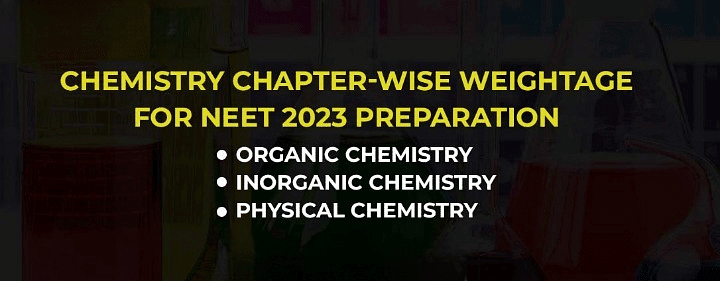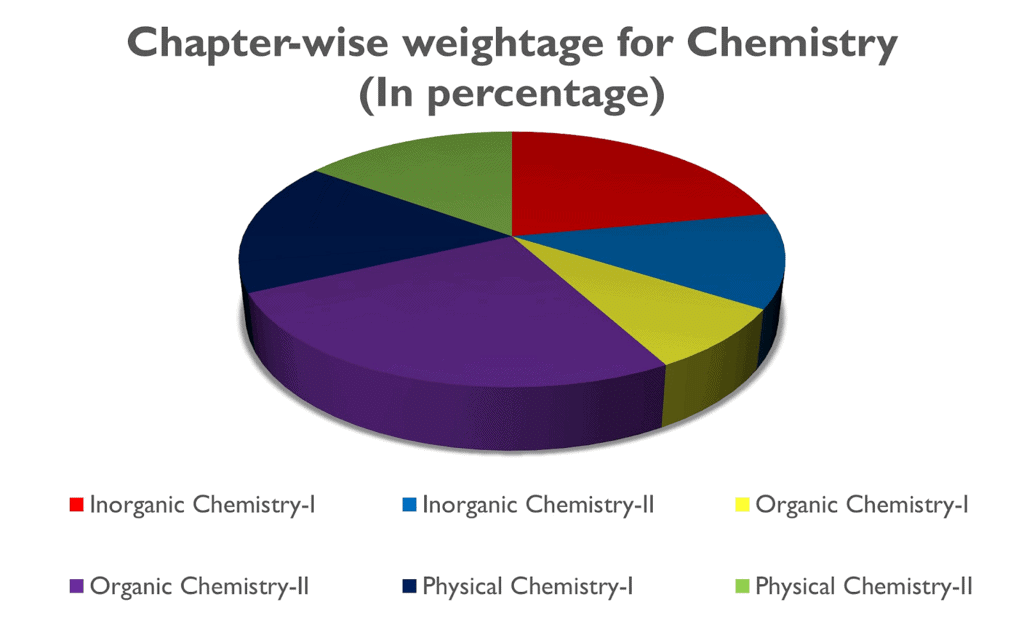NEET 2026 Chemistry Syllabus with Weightage | News & Notifications: NEET PDF Download
The National Eligibility cum Entrance Test (NEET) is one of the most important entrance examinations for admission to medical courses in India. It is conducted by the National Testing Agency (NTA). The exam tests the knowledge of aspiring medical students in the subjects of Physics, Chemistry, and Biology. Chemistry is one of the three main subjects of the exam and is considered to be the most important section by many. In this article, we will discuss the weightage of Chemistry in the NEET exam.

NEET 2023 Chemistry Syllabus
S. No. | Class XI | S. No. | Class XII |
1 | 1 | ||
2 | 2 | ||
3 | 3 | ||
4 | 4 | ||
5 | 5 | ||
6 | 6 | ||
7 | 7 | ||
8 | 8 | ||
9 | 9 | ||
10 | s-Block Element (Alkali and Alkaline earth metals) | 10 | |
11 | 11 | ||
12 | 12 | ||
13 | 13 | Organic Compounds containing Nitrogen | |
14 | 14 | ||
15 | |||
16 |
NEET Chemistry Chapter-wise Weightage 2023
Chemistry is an important subject in the National Eligibility cum Entrance Test (NEET) 2023. The NEET exam syllabus includes topics from various branches of Chemistry and carries a weightage of 45 questions, 180 marks out of the total 720 marks. It is important for aspirants to have a good understanding of the Chemistry syllabus in order to excel in the exam. This article provides an overview of the NEET chapter wise weightage for Chemistry for the year 2023.
NEET Chemistry chapter wise Weightage
Class XI | ||
Unit | Topic / Chapters | Weightage* |
I | 1% | |
II | 2% | |
III | 2% | |
IV | 5% | |
V | 2% | |
VI | 8% | |
VII | 6% | |
VIII | 3% | |
IX | ||
X | 2% | |
XI | 2% | |
XII | 4% | |
XIII | 3% | |
XIV | 2% | |
Class XII | ||
Unit | Topic / Chapters | Weightage* |
I | 2% | |
II | 5% | |
III | 2% | |
IV | 3% | |
V | 2% | |
VI | 2% | |
VII | 5% | |
VIII | 4% | |
IX | 9% | |
X | 3% | |
XI | 4% | |
XII | 4% | |
XIII | Organic Compounds containing Nitrogen | 2% |
XIV | 3% | |
XV | 3% | |
XVI | 2% | |
Total | 100% | |
*Approximate weightage; based on previous year exams and experts’ analysis
Weightage Distribution for Physical, Organic and Inorganic Chemistry
The Chemistry section of NEET for 2023 will involve topics in Organic Chemistry, Inorganic Chemistry, and Physical Chemistry. The following table provides the weightage of Chemistry for NEET 2023.
Chemistry Chapters and topics | Average no. of Questions from the chapter | Weightage of the chapter and topic (In percentage) |
Inorganic Chemistry-I | 22% | |
Chemical Bonding | 4 | 9% |
3 | 7% | |
Periodic Table & Periodicity in Properties | 2 | 4% |
1 | 2% | |
1 | 3% | |
Inorganic Chemistry-II | 12% | |
3 | 6% | |
2 | 4% | |
Metallurgy | 1 | 2% |
Qualitative Analysis | 1 | 2% |
Organic Chemistry-I | 8% | |
2 | 4% | |
General Organic Chemistry | 2 | 5% |
Organic Chemistry-II | 26% | |
1 | 2% | |
2 | 3% | |
1 | 2% | |
2 | 4% | |
Aromatic Compounds | 3 | 6% |
2 | 4% | |
Carbonyl Compounds | 2 | 4% |
Organic Compounds containing nitrogen | 2 | 3% |
2 | 3% | |
Environmental chemistry | 1 | 2% |
IUPAC & Isomerism | 2 | 4% |
Practical Organic Chemistry | 1 | 2% |
Physical Chemistry-I | 17% | |
Atomic Structure & Nuclear Chemistry | 1 | 3% |
1 | 3% | |
2 | 4% | |
1 | 2% | |
Gaseous State | 1 | 3% |
Mole Concept | 2 | 5% |
1 | 3% | |
Physical Chemistry-II | 15% | |
2 | 4% | |
1 | 3% | |
1 | 3% | |
2 | 4% | |
1 | 2% | |

Important Chapters for NEET Chemistry 2023
The following table outlines key topics from Organic, Inorganic, and Physical Chemistry that are relevant to the NEET Chemistry section.
| |
| |
|
Note:- Candidates must focus on other chapters as well which are mentioned in the syllabus as questions will be there from other topics also.
NEET Books for Chemistry
The syllabus for the NEET exam in Chemistry should be based on the material from NCERT. Chemistry includes topics such as Inorganic Chemistry, Organic Chemistry, and Physical Chemistry.
Books for Physical Chemistry
Candidates wishing to excel in physical chemistry must be familiar with computation and estimation. To help them, the following books have been recommended for NEET chemistry:
- NCERT (Textbook) Chemistry – Class 11 & 12
- Physical Chemistry by P. Bahadur
- Physical Chemistry by O.P. Tandon
Books for Organic Chemistry
Organic chemistry is a key component of the NEET Chemistry curriculum with recurrent questions and high weightage. It is therefore essential to be well-versed in name reactions and reaction mechanisms. The following are some recommended NEET preparation books for organic chemistry:
- NCERT (Textbook) Chemistry – Class 11 & 12
- Organic Chemistry Objective by Arihant (for practicing problems)
- Organic Chemistry by O.P. Tandon
- Organic Chemistry by Morrison and Boyd (For reaction mechanisms)
Books for Inorganic Chemistry
Inorganic chemistry is the simplest part to study. Questions related to this subject are generally based on memorization, so it is important to revise regularly. NCERT textbooks are sufficient to study this topic, but the following books are also recommended for NEET inorganic chemistry:
- Concise Inorganic Chemistry (For Chemical Bonding, Atomic Structure and Coordination Chemistry)
- Inorganic Chemistry by O.P. Tandon
Frequently Asked Questions (FAQs) related to Chemistry Weightage
Why is it important for students to be aware of the weightage during NEET preparation?
It is essential for students to be aware of the NEET syllabus and the relative weightage of each chapter before they start studying. This enables them to prioritize their study material and understand which topics need to be given more attention.
What are some important topics in NEET Chemistry?
The NEET Chemistry exam is known to be a high-scoring section. For students to do well on the test, they should have a thorough understanding of all topics in the syllabus. An analysis of the past few years' exams suggests that the following chapters have yielded the most questions:
(i) Hydrocarbons
(ii) Equilibrium
(iii) Coordination Compounds
(iv) p-Block Elements
(v) Solutions
(vi) Organic Chemistry: Basic Principles & Techniques
(vii) d- and f-Block Elements
(viii) Chemical Bonding and Molecular Structure
(ix) Electrochemistry
(x) Aldehydes, Ketones and Carboxylic Acids
Is relying solely on NCERT enough for NEET 2023 preparations?
NCERT is undoubtedly a key resource for NEET 2023 preparation, but it is recommended to supplement it with other trusted books for a better understanding of the concepts and formulae.
How many questions will be there from each section?
There will be a total of 200 questions in NEET 2023 out of which candidates will have to attend 180. Biology section will contain 100 questions whereas 50 questions will be in each Physics and Chemistry section.






















